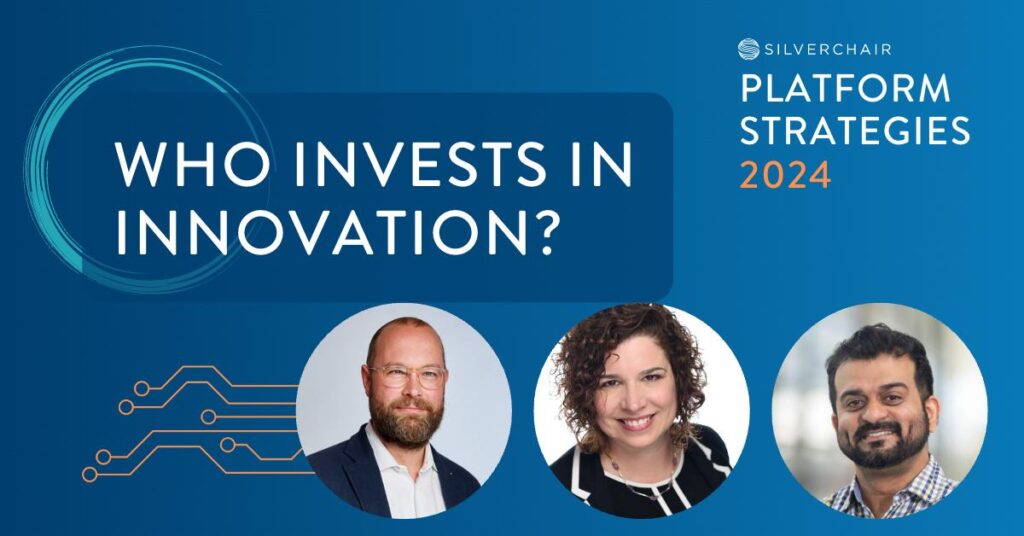
Our expert panelists sought to answer this question in the 'Who Invests in Innovation?' panel at Platform Strategies 2024. The panel, moderated by Will Schweitzer (CEO of Silverchair), featured Sarah Tegen (Senior Vice President and Chief Publishing Officer, Publications Division, American Chemical Society), Sven Fund (Managing Director, Reviewer Credits), and Sourav Dutta (Chief Strategy Officer, Cactus Communications). Their conversation shed light on the industry's challenges and opportunities and the criteria they use when evaluating potential investments.
Unique Approaches To Investments
The discussion began with each panelist sharing their approach to investments. Sarah Tegen explained that the American Chemical Society, as a non-profit organization, focuses on strategic investments that align with their mission:"We're looking for things that are really going to help our community thrive. Where are the places that our authors, or editors, or reviewers, or readers really need some support to make their publishing journey, their research journey easier?"Sven Fund, an angel investor, highlighted the importance of investing in people and market potential in early-stage investments:
"I am interested in investing in people, because it's so early stage. I mean, many of the companies or ideas I invest into are not even companies when people approach me. So there is no point in looking at Excel, really. There's a point in looking at market potential, but then at people, whether you trust them or not."Sourav Dutta outlined Cactus Communications' investment framework, including capability acquisitions, market share acquisitions, and hedging against disruption. He noted:
"What has also happened in the recent past is our industry, as a lot of conversations have happened over the last 36 hours now, that it is open to disruption. So the third lever that we are now looking at and we've been looking at actively for the last few years is, how do we hedge against disruption?"
Challenges For Investors In Scholarly Communications
The scholarly publishing industry presents unique challenges for investors, a point agreed upon by the panelists. Sarah Tegan pointed out the slower pace of change in academia:"I think that the impetus to change in academia is slow at best. So I think that the way that you train graduate students today looks a lot like the way I was trained 25 years ago."Sven Fund likewise asserted that the industry's stability may be hindering innovation:
"I would be slightly more pessimistic, frankly. I think this industry just gets away with it. So there is no need to innovate from a perspective of profitability of returns."

Expanding Industry Reach And Areas For Improvement
The discussion also touched on the potential for expanding the industry's reach. Sourav Dutta highlighted the success of companies that have looked beyond traditional academic publishing:"If we increase that circle of influence to include a few other stakeholders and start catering to them, this pie will suddenly look a lot larger, maybe 10x larger."They identified several opportunities for investment within the industry:
- Improving technology stacks
- Building scalable solutions that can extend to other industries
- Enhancing funding transparency and processes
- Advancing true digitization, particularly in data publishing
"As a global community, we as a national community, whatever, we are so much poorer if we don't continue to invest in the humanities, right?"The panel also raised an important question about the industry's defensive mindset, asking what it will take for real innovation to thrive and for us to shift that defensive mindset.
The Need For Collaboration
Sven Fund put forward an example of how cross-publisher initiatives might drive innovation in peer review, and argued that currently, there is not enough standardization for peer review, making it confusing for researchers and reviewers:"If you would standardize peer review, a minimum standard for whatever has to happen in peer review, why are there publishers with 2,000 journals that have 2,000 processes on peer review? That cannot be good, and it shows that you never thought of the researcher that always has to understand this is an ACS, RIC, Wiley, Elsevier journal."Will Schweitzer concluded the session with a call for a shift in mindset:
"It starts with kind of our ethos. It starts with our leadership and risk taking mentality, which is, if we accept that we're playing a long game and we are fortunate enough to have organizations that can support small bets and investments, I think a lot would change in this market, and it is as much a mindset thing as it is anything else."The panel discussion highlighted the complex landscape of investment and innovation in scholarly publishing. While the industry faces challenges in adapting to change, opportunities exist for those willing to take risks, think long-term, and expand their focus beyond traditional boundaries. As technology continues to evolve and researcher needs change, publishers and service providers must find ways to innovate while maintaining their core mission of supporting the scholarly community.
Looking to discover more insights from Platform Strategies 2024? Explore the rest of our blog series and experience the full recording of this session.